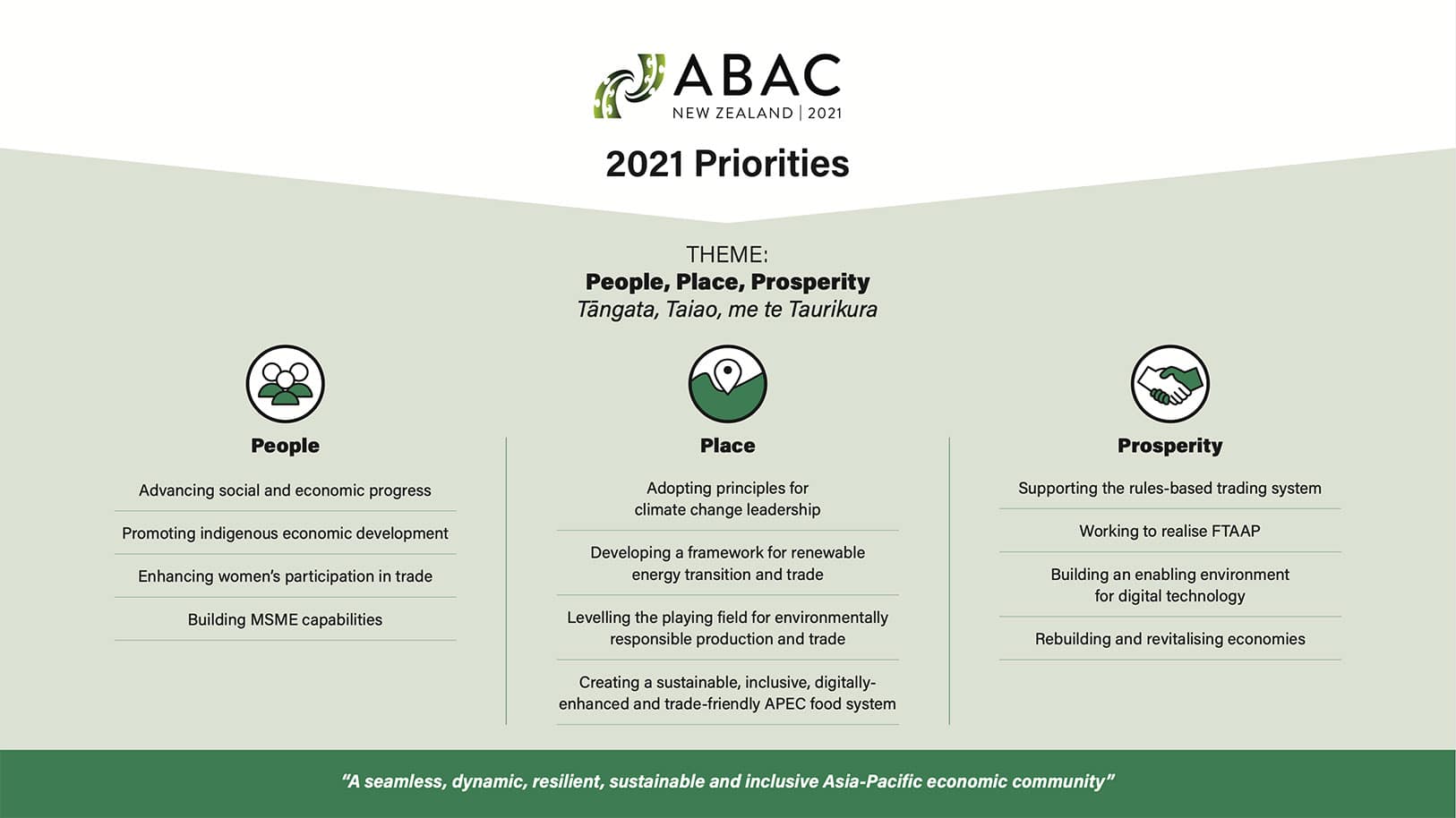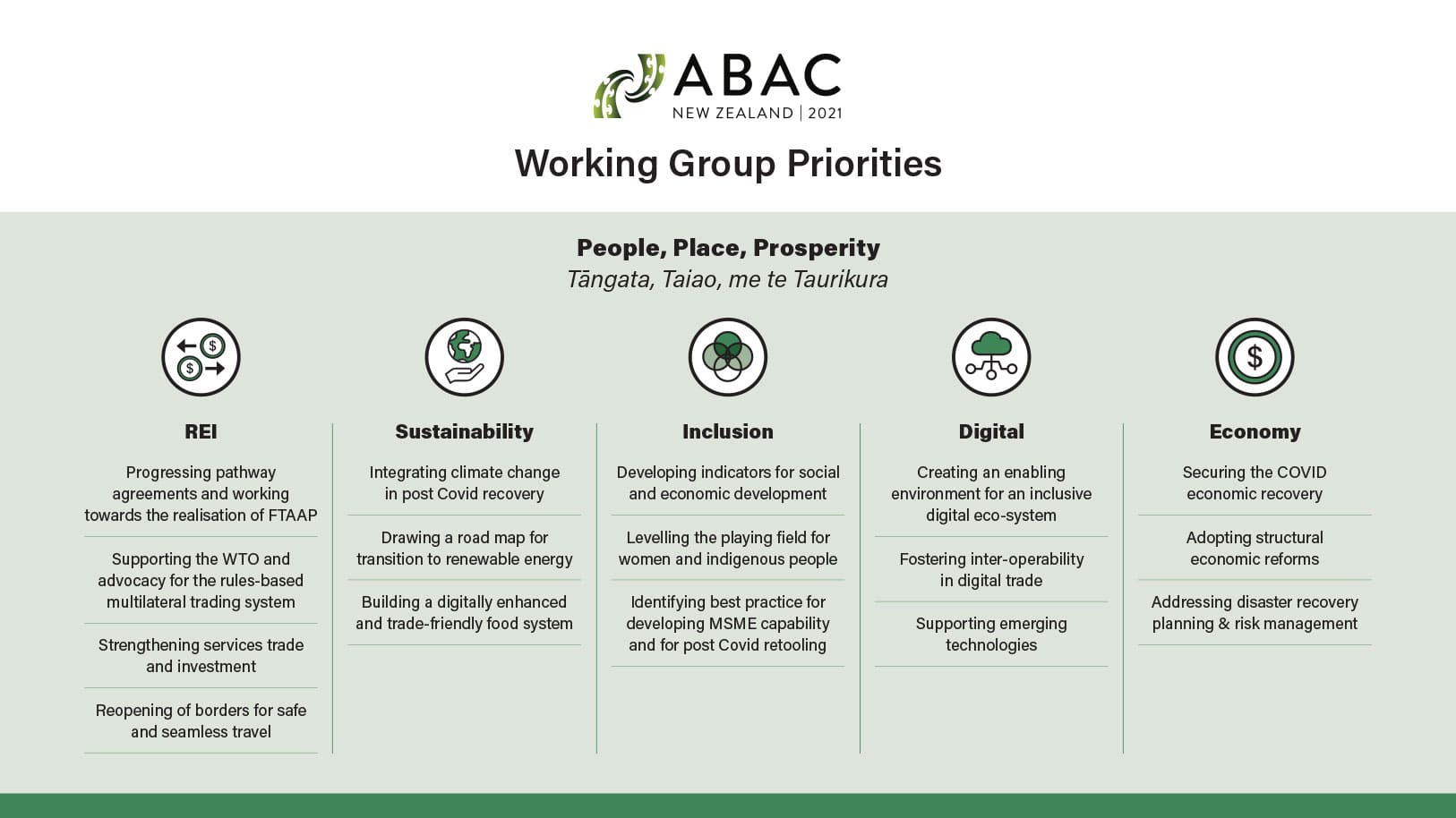April 2025 Introduction This submission is being made on behalf of the New Zealand International Business Forum (NZIBF), whose members are listed at...
New Zealand is chairing APEC in 2021 and Rachel Taulelei will the Chair of ABAC. To do this effectively we need to:
1. Hear what business needs to be successful in the Asia Pacific
ABAC NZ wants to hear the policy views of New Zealand business and to use these to shape ABAC’s recommendations to APEC. The three New Zealand Members will sit alongside counterparts from APEC’s 21 economies and speak directly to APEC’s Economic Leaders. The views advanced by New Zealand business will inform the perspectives communicated by the three New Zealand Members, and in that way, help advance the ABAC work programme.
2. Get ‘air time’ for Māori business
APEC is particularly relevant to the $50 billion Māori economy. Engaging Māori business with ABAC’s agenda will help make our work more relevant and responsive to Māori economic concerns and development aspirations. Our hope is that improving the visibility of the Māori economy within ABAC will also help raise the visibility of indigenous people across the region.
3. Advance ABAC in a distinctively Kiwi way
Three broad themes have been developed to carry the business conversation in ABAC in a way that is both distinctive and relevant:
Tāngata, Taiao me te Taurikura (People, Place and Prosperity).
These themes provide an umbrella for more specific topics that ABAC NZ is developing for ABAC as a whole.
The following diagrams illustrate how ABAC NZ’s priorities as Chair will translate into the ABAC work programme carried out by ABAC’s five working groups in the areas of Regional Economic Integration, Sustainability, Inclusion, Digital and Economy.


ABAC NZ is keen to hear from NZ business sectors about their interests in the ABAC work programme in 2021.
ABAC Priorities for 2022
This year, ABAC has adopted the theme “Embrace. Engage. Enable.”
Embrace the reconnected world with endless opportunities.
Enable in collaborating on new ideas, creativities, and possibilities.
Engage digitised, sustainable, and inclusive new transformational models.
The 2022 work programme will focus on the following priorities:
Regional Economic Integration Working Group
- Progressing pathway agreements towards the realization of FTAAP
- Supporting the WTO and advocacy for the rules-based multilateral trading system
- Strengthening services trade and investment
- Reopening borders for safe and seamless travel
Digital Working Group
- Establishing foundational digital infrastructure
- Accelerating the adoption of digital tools for trade facilitation
- Expanding vital physical infrastructure to expedite the digitalisation of the economy and advance digital inclusion
MSME and Inclusiveness Working Group
- Promoting digital transformation of MSMEs
- Enhancing inclusion through women’s economic empowerment
- Promoting sustainable practices
- Building MSMEs’ financial capacity
Sustainability Working Group
- Building next zero economy and promoting green recovery in APEC
- Fostering a sustainable food system
- Advancing realistic energy transition towards low-carbon in APEC
Finance and Economics Working Group
- Promoting speedy and sustained recovery
- Developing a public-private partnership framework for pandemic risk transfer
- Financing the transition to sustainability
- Building an enabling ecosystem for digital finance
Detailed recommendations will be developed during the course of 2022 on the priorities identified in the work programme. ABAC’s recommendations will be conveyed to APEC governments through a range of avenues including to APEC Senior Officials, Trade SME and Finance Ministers and directly to APEC Economic Leaders at the annual Dialogue with APEC Leaders.
ABAC Priorities for 2023
The ABAC USA theme for 2023 is “Equity. Sustainability. Opportunity.”
The 2023 Work Program will have the following initial areas of focus:
Economic Integration Working Group
- Accelerating towards the realization of FTAAP
- Supporting the WTO and advocacy for the rules-based multilateral trading system
- Improving trade resilience
- Trade and sustainability
Sustainable Growth Working Group
- Promoting an effective response to climate change and transition to a low-carbon economy
- Advancing realistic energy transition towards low carbon in the region
- Addressing efficient and sustainable processes across the food value chain in the region
Digital and Innovation Working Group
- Strengthening cybersecurity
- Promoting coherent and interoperable digital identity systems
- Facilitating cross-border data flows
Finance Task Force
- Facilitating cross-border digital financial services
- Supporting just and affordable transition
- Financing sustainable innovation
- Promoting interoperable central bank digital currencies
- Facilitating cross-border data flows in financial services
Inclusion Task Force
- Advancing women’s economic empowerment
- Engaging indigenous people in the economy
- Formalizing the informal economy
- Bridging generations through economic engagement
Detailed recommendations will be developed during the course of the 2023 focus areas identified in the work program. ABAC’s recommendations will be conveyed to APEC governments through a range of avenues including to APEC Senior Officials, Trade, SME and Finance Ministers and directly to APEC Economic Leaders at the annual Dialogue with APEC Leaders.
ABAC Priorities for 2024
The ABAC Peru theme for 2024 is “People, Business, Prosperity”. The 2024 work programme will have the following initial areas of focus:
Regional Economic Integration Working Group
- Revitalising the strategy towards FTAAP and regional trade architecture
- Advancing digital trade and a new services agenda
- Creating an enabling investment environment through investment facilitation practices
- Modernising tax systems in the era of the digital economy.
This year the REIWG will be chaired by Rachel Taulelei of ABAC New Zealand
Sustainability Working Group
- Securing food sustainability and advancing responsible natural resource management
- Fostering circular economy practices and effective waste management
- Driving the shift to low-carbon economies and energy transition
- Enhancing natural disaster risk preparedness and building robust infrastructure.
Human Development Working Group
- Strengthening pensions and healthcare systems
- Boosting digital transformation for human and skills development
- Facilitating financial inclusion.
In addition to the three working groups, in 2024 there will be two task forces. The task forces are responsible for steering cross-cutting issues across all working groups, ensuring alignment and synergy with their specific priorities:
Digital Innovation Task Force
- Artificial Intelligence (AI) and trade
- AI and governance
- World Trade Organization (WTO) and digital.
Finance and Investment Task Force
- Domestic digital finance platforms.
REGISTER WITH TRADE WORKS
Register to stay up to date with latest news, as well as saving and discussing articles you’re interested in.
Latest News
SUBMISSION TO THE MINISTRY OF FOREIGN AFFAIRS AND TRADE ON A COMPREHENSIVE FREE TRADE AGREEMENT WITH INDIA
April 2025 Introduction This submission is being made on behalf of the New Zealand International Business Forum (NZIBF), whose members are listed at Annex A[1]. NZIBF is a group of senior business leaders working together to promote New Zealand’s engagement in the...
LAMENTATION DAY
When President Trump spoke in the White House Rose Garden to launch his wrecking-ball “fair and reciprocal tariffs”, there were some in the audience wearing hard hats. While this was doubtless to show support for the move amongst hard-working Americans, maybe...
BUSINESS FORUM DEEPLY DISAPPOINTED WITH UNJUSTIFIED US TARIFFS
Media release, 4 April 2025 The New Zealand International Business Forum (NZIBF) has reacted with deep disappointment to the news that the United States will implement an additional 10 percent ad valorem tariff on New Zealand exports. “The United States is a close and...
Bull in a China Shop: Market Price Support in the Dairy Industry
Market price support policies (aka as “subsidies”) in the agriculture sector are a classic example of what is meant by 'beggar thy neighbour'. One country attempts to improve its own economic situation by intervening in the market on behalf of its producers, at the...
BUSINESS FORUM WELCOMES INDIA FTA NEGOTIATIONS
Media release, 17 March 2025 The NZ International Business Forum (NZIBF) welcomes the launch of free trade negotiations with India, announced in Delhi, and is particularly pleased that these will proceed on a comprehensive basis. “There is enormous value to be gained...
Playing the long trade game with India
Prime Minister Luxon is at last making his visit to India with a large business and community delegation. We wish them well in expanding and deepening the relationship with India. The reasons for doing so we have explained previously. Our Government’s...
SUBMISSION TO THE MINISTRY OF FOREIGN AFFAIRS AND TRADE
Submission to MFAT by NZIBF on the proposed green economy join working group with Chile and Singapore
PRESENTATION TO APEC BUSINESS ADVISORY COUNCIL: ADDRESSING PROTECTIONISM AND NON TARIFF BARRIERS
BRISBANE, 24 FEBRUARY 2025 STEPHEN JACOBI, EXECUTIVE DIRECTOR, NZIBF My thanks to Anna Curzon and Stephanie Honey for giving me one last opportunity to speak to ABAC. I want to talk today about rising protectionism and proliferating non tariff barriers. It’s not a new...
Business Leaders Sound Alarm on Global Economic Uncertainty: Call for Unified APEC Action
Among rising global economic tension, the APEC Business
Advisory Council met in Brisbane this week to reaffirm its support for the value of trade and cooperation,
and the original APEC commitment to free, fair, open and rules-based trade.
REMARKS TO FOREIGN AFFAIRS, DEFENCE AND TRADE COMMITTEE – 20 FEBRUARY 2025
Stephen Jacobi presented to the Foreign Affairs, Defence and Trade Select Committee in support of the NZ/UAE Closer Economic Partnership. He emphasised the need for the Government to follow through on undertakings around paperless trade.
